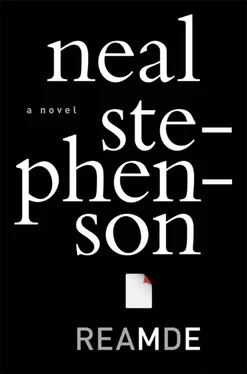A key difference was that he got to have inappropriate emotional responses. “This is fucking cool,” he remarked, gazing down from an altitude of perhaps a thousand feet at a corpse- and skeleton-strewn meadow where something like twenty different Medieval Armed Combat encounters were going on simultaneously. “We should pay these guys to do this all the time.”
“Which guys?”
“Whoever created this virus.”
“Oh.”
“Who did create it, by the way?”
“Unknown,” C-plus said, “but thanks to your niece, we’re pretty sure he’s in Xiamen.”
“The place with the terra-cotta soldiers?”
“No, you’re thinking of Xian.”
“Zula’s been helping you track these guys down?”
C-plus looked a bit taken aback. “I thought you were aware of it.”
“Of what?”
“Her participation. She said it was a side project that you had put her on.”
Had it been anyone else, Richard would have said, I have no idea what the hell you are talking about, but since it was family, his instinct was to cover for her. “There may have been some mission drift,” he speculated.
“Whatever. Anyway, we have an IP address in Xiamen, but nothing else.”
Richard put Egdod into auto-hover mode, then leaned back and took his hands off the controls. “Are the Chinese cops among those who have been pestering us to do something about this?”
“They were among the first to do so, is my understanding.”
“Then one way to shut them up—”
“—is to ask them to trace down this IP address for us. Yes, I agree; we would never hear from them again.”
“So are we going to do that?”
“I doubt it,” C-plus said, “because we’d be giving up information about our own internal procedures. And I’m pretty sure Nolan doesn’t want to do that.”
“And, come to think of it, I’m sure Nolan’s right,” Richard said. “I’m an idiot. Let’s not tell the Chinese government anything.”
“Are you asking me to pass that on to our CEO?” Corvallis said, in a tone of voice making it clear that, if flat out asked, he’d flat out refuse.
“Nah,” Richard said, “I have other reasons to ruin his day.”
In the dark, driving through Xiamen was like driving through any other modern city, save that they were more exuberant, here, about lighting things up; the highway was illuminated with dashed lines of blue neon, and bright signs, some familiar corporate logos and others unreadable by Zula, erupted from the tops of buildings.
They stopped at a brand-new Hyatt not far from the airport and dropped off the two pilots. Then they followed what she took to be a ring road, since water was always on their right, until they were in the middle of what had to be the most crowded and built-up part of the island. This was more than a match for Seattle. The waterfront to their right was an unbroken series of low-slung passenger ferry terminals. To their left was a mixture of buildings: some brand-new skyscrapers, some pre-economic-miracle hotels and office structures rising to perhaps ten or fifteen stories, some vacant lots-cum-construction-sites, and a few tenacious patches of old three- to seven-story residential neighborhood buildings.
They turned off the ring road into a place that had been landscaped recently. A huge steel door raised, and they descended into a parking structure beneath an office tower. The parking spaces hadn’t been striped yet, and the lighting was temporary. Construction tools and supplies were piled around.
The two vans had caravanned the whole way behind the black Mercedes. A Chinese man, dressed informally, but seeming to wield great authority, climbed out of the backseat of the Mercedes. Ivanov, who had been sitting next to him, climbed out of the other side. The Chinese man used a key card to summon an elevator. He held the door open as Ivanov, the seven security consultants, Zula, Peter, and Csongor crammed themselves aboard. Then he pushed himself in, swiped his card, and hit the button for the forty-third floor. All told, the building seemed to have fifty stories.
Standing in an elevator with a bunch of strangers felt a little awkward even in the best of circumstances. Never more so than now. Zula, and most of the others, stared at the control panel, which was ostentatiously high tech; above it was an electroluminescent screen that flashed the numbers of the floors as they went by and occasionally displayed Chinese characters as well, synchronized with a lush female voice speaking canned phrases in Mandarin.
Floor 43 sported a reasonably nice elevator lobby, lined in expensive-looking polished stone and equipped with men’s and women’s bathrooms. Beyond that, it consisted of two large office suites of equal size. The one to the left, as they stepped off the elevators, was completely unfinished. The floors were bare concrete. The ceilings were just the underside of Floor 44: corrugated steel deck frosted with foamy stuff and supported at wide intervals by huge zigzagging trusses. The suite to the right seemed to have been built out recently but never occupied. Double doors of plate glass, set in a plate-glass wall, gave way to a reception area containing a built-in desk but no furniture. Beyond that was an open space about the size of a tennis court, obviously destined to become a warren of cubicles. Around the perimeter were glass-walled offices of various sizes, each with a window. The largest of these was a conference room with a large built-in table and sprays of unconnected Ethernet cables hanging out of hatches in its center. Other than that there was no furniture in the whole place. The floor was covered in brown-gray carpet, and the ceiling was a grid of acoustical panels interrupted here and there by light fixtures and vent louvers.
It was, in other words, the most perfectly generic office environment that could be imagined.
“Safe house,” Sokolov announced, and he indicated by gestures that Zula, Peter, and Csongor might wish to make themselves comfortable in the middle of the open space.
Ivanov departed in the company of the Chinese man.
Three of the security consultants set to work bringing up all the cargo that had been flown in on the plane and packed into the vans. They had been supplied with elevator key cards and so were free to come and go as they wished.
One of the security consultants was stationed at the reception desk, thereby controlling entry to and exit from the suite. As soon as all the cargo had been brought up, he connected the entry doors together with a cable lock.
One security consultant went into the men’s room, which was off the elevator lobby, and apparently bathed as best he could in the sink. Certain of the bags coming up from below contained bedrolls and personal effects. He selected one of these and carried it into a vacant office, where he rolled out a sleeping bag and lay down and stopped moving. Two of the cargo movers followed his lead as soon as they were finished with their job, while the third, after rooting around in bags for a while, distributed some thick black plastic packets that turned out to contain military rations. He assembled a portable stove on the floor, ignited it, and began to heat water.
Sokolov and one other security consultant made a thoroughgoing reconnaissance of the forty-third floor. They began by clambering up on the conference table. The consultant gave Sokolov a leg up, enabling his boss to pop up through a ceiling tile and commence an exploration of the crawl space above the ceiling. The ceiling grid itself was made of flimsy aluminum extrusions, suspended from the true ceiling by a web of wires, and completely incapable of supporting a person’s weight. Assuming that this half of the building was a mirror image of the vacant suite next door, however, there were heavy steel trusses at regular intervals, consisting of T-shaped beams connected by zigzagging rods of steel, and a reasonably acrobatic person could use those as monkey bars to travel around above the ceiling. Zula, Peter, and Csongor, sitting on the floor and eating their rations in the middle of the vacant space, heard Sokolov and scraping and clanging as he made his way overhead, and heard him thumping in an exploratory way on the walls that defined the boundary between this suite and the elevator lobby/bathroom core. The conclusion seemed to be that those walls went all the way up to the underside of Floor 44 and that this suite, therefore, could neither be escaped nor infiltrated by the common action-movie trick of moving around above the ceiling. In the same spirit, Zula looked around at the ventilation louvers and noted that they were all far too small to admit a human body.
Читать дальше





